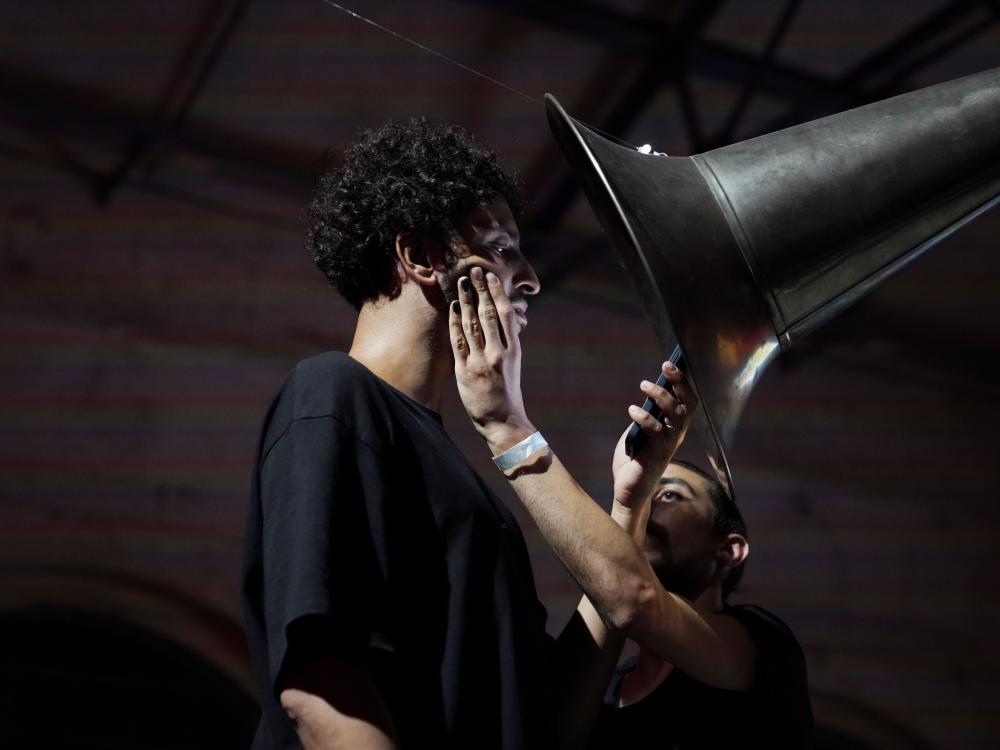The Concretely WE: Voices From Within the Camp
Mohamed-Ali Ltaief has critically engaged with the sound archives of the Berliner Phonogramm-Archiv, part of the Ethnological Museum in the German capital. In his research, he uncovered the story of Sadok Ben Rachid, a Tunisian poet, singer, and prisoner in the First World War. He was recruited by the French in 1914 to serve in their North-African forces and was captured by the German army in Ypres, Belgium a year later. In a collective performance, Ltaief, Fofana and Tarxun overlap fact and fiction.
Between 1915 and 1918, the Prussian Phonographic Commission (Germany) made recordings at Wünsdorf, a prison camp near Berlin where, along with others, Sadok was held. These sound collections were invented in the context of the First World War under the violence of European colonialism, where the classification was based on an ethnic speculation that distinguished between popular music (non-modern), traditional music (historical) and modern music (European). Ltaief reunites these sound archives with Ben Rachid's poetry and Frantz Fanon's play Parallel Hands (1949) in a single performance.
Inspired by Fanon's work on the consequences of colonial oppression and its capture of voices and bodies, Ltaief wants to create a counter-narrative to resist the colonial classification in the early sound archives. Sadok Ben Rachid is a good guideline for this. His sonic refusal/poetry is literally and figuratively an opposing voice. The performance is based on Sadok's original sound recordings and engages with counter-archives. It questions the dispositive of sonic archival material in these colonial collections by displacing the ethnomusicological aporia, and unravels the attitude of the Humboldt Forum (Berlin) towards these pages of history: as a deafening silence.
• Mohamed-Ali Ltaief is an artist and writer, born in Tunisia and based in Berlin. His work explores notions of temporality, spatiality, and geo-philosophy, and is especially interested in the unestablished history of art, lost or abandoned by the singular, ‘universal’ history of modernity. His projects include Ghosts of Meaning (2019) presented at the Present Is Not Enough Festival, HAU2, Berlin, Germany (2019), The Path of the Sun or the Bare Life (Madrasa El Achouria, Medina of Tunis, Tunisia, 2021), and the sonic performance and publication The Strangeness of the Stranger (Book Works and Radio Resonance, London, England, 2021).
• Lamin Fofana is an artist and musician currently based in New York. His music contrasts the realities of our world with what lies beyond, and explores questions of movement, migration, alienation, and belonging. His latest releases include Ballad Air & Fire, Shafts of Sunlight, and The Open Boat (an album trilogy). In 2021, Fofana was awarded a Foundation for Contemporary Arts Grants to Artists and was nominated for the National Gallery Prize in Germany. Fofana presents a monthly radio show on NTS Radio, a London-based online radio station.
• Tarxun (Farshad Xadjehnassiri) is an Iranian sound artist and urban researcher based in Berlin. They studied architecture, and earned a BA at Azad University of Tehran and an MA in Sound Studies at Berlin University of the Arts. Tarxun actively questions the blurred boundaries of crafts in a performative way. Tarxun has had installations at TADAEX (Tehran 2016), GAPS curatorial (London 2017, Tehran&Turin 2019), and Virtual AMOUR (Berlin Art Week 2019), as well as solo works and performances.
concept & text Mohamed-Ali Ltaief | performance Mohamed-Ali Ltaief | with Lamin Fofana and Tarxun The Concretely WE: Voices From Within The Camp | performance part of The Striated Time performance trilogy project | with the kind support of the Mophradat consortium-commissions/2023-2025 | co-production Centrale Fies, Dro (IT), Kaaitheater (BE), and Tanzfabrik Berlin (DE) | photography Alessandro Sala (courtesy Centrale Fies)
This performance deals with incarceration and racism.


